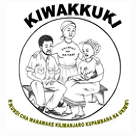KIWAKKUKI is a Kiswahili acronym (Kikundi cha Wanawake Kilimanjaro Kupambana na UKIMWI) which means Women Against AIDS in Kilimanjaro region. It was founded in 1990 around the theme of World AIDS Day “Women and AIDS”. It formally registered as an NGO July 1995 and complied with the NGO Act.24/2002 in February,2011 with No.00001413 with the goal of enhancing women's access to information on HIV and AIDS and empowering them with skills essential for fighting HIV and AIDS in their communities. In those years the pandemic was a scaring threate for people, with high prevalence rate accompanied by high levels of stigma, various misconceptions and beliefs about the disease. On other hand the communities had limited access to information, and some cultural norms posed challenges to fight AIDS. Thus,the organized group of women (KIWAKKUKI) was formed to help the communities deal with such challenges .
It is a women membership organization with 5460 women and about 133 men as honorable members in the grassroots groups and employees.The uniqueness of KIWAKKUKI is how women from different villages and households in Kilimanjaro Region formed grassroots groups and joined together. In one constitution they formed the BIG registered organisation that has gone through a lot of challenges at different stages during its formation due to culture, stigma, misconceptions and beliefs.
OUR VISION
Is having a responsible community taking appropriate measures to fight against HIV and AIDS, poverty and contributing efforts to mitigate AIDS impact.
OUR MISSION
Is integrate holistic programs that focus on HIVand AIDS prevention and increased community empowerment to support those infected and affected by HIV and AIDS with conscious gender mainstreaming.
KIWAKKUKI members are linked by cherished values of:
- Voluntarism
- God fearing
- Unity
- Respect
- Sharing
- Recognition of talents
- Love
- Transparency
- Accountability
- Working as a team
The heart of KIWAKKUKI is its members in grassroots groups in every district in the region. Members register into Grassroots groups when they join KIWAKKUKI. There are over 150 active groups. Each group has 20 – 30 members. The KIWAKKUKI Headquarters in Moshi functionally coordinates KIWAKKUKI activities in the seven districts of Kilimanjaro. Each District has a KIWAKKUKI sub-office. A District office coordinates 20-30 grassroots groups.
KIWAKKUKI covers a Project Area of 80% of the total wards in the 7 Districts of Kilimanjaro. With empowerment, grassroots women members have made a big difference in the war against HIV and AIDS in Kilimanjaro Region. Men’s empowerment and participation is honoured as partners in development and decision making related to HIV prevention & AIDS care issues.
We are committed to the development and implementation of innovation and sustainable service delivery in HIV/AIDS, care, prevention and support by employing a health system strengthening approach. The organization contributes towards improving capacity to respond and cope with the scourge by implementing a variety of projects and activities that include:
- Promote HIV/AIDS prevention through community awareness raising for behaviour change,
- Same day result Voluntary Counseling and Testing that is done by stand alone service as an entry point to care and support.
- Provision of Home Based Care services and linkages to post test club as an aspect of continuum of care and positive prevention.
Impact mitigation
- Support to Most Vulnerable Children that includes psychosocial support, shelter, memory work and child rights, nutritional support, school sponsorships and scholastic materials.
- Addressing Gender imbalances, abuse of rights, high levels of poverty and stigma reduction are cross cuting themes while Economic and social gender inequity is a major driver of the HIV epidemic in Tanzania, with women and girls more vulnerable to HIV infection than men. KIWAKKUKI believes that once women are capacitated with information it means that the whole family and community at large will be informed.
- Through community development projects in micro-credit aspect.
The major commitments of KIWAKKUKI are in harmony with those of the Tanzanian government and also address the Millennium Development Goals. For the past 20 years, KIWAKKUKI’s approach has been an integration of HIV/AIDS activities into the national short, medium and long term plans, namely Vision 2025, National Strategy for Growth and Reduction of Poverty (NSGPR) and the Tanzania’s Development Vision 2025. KIWAKKUKI covers 16 out of 18 Strategies streamlined by Tanzania Coordination on AIDS (TACAIDS) which is a significant contribution to the National Efforts.
We have urgent challenges to the values we share that demands action now, some are: The increasing needs and demands for services and expectations from the target groups in the community in relation to the minimum resources available. Increasing prevalence to the minority youth community while at the same time there is progressive less interest from funding agencies supporting directly HIV and AIDS interventions.
Strategies to rescue the situation include encouraging interventions that focus on improving youth understanding of HIV and AIDS, and community livelihood projects responses especially for the marginalised groups in the community. More emphasis to community ownership of the whole process of service delivery which will create sustainability. The immediate needs of the organisation are therefore resources that will be used to train families and beneficiaries who are now partially resuming their responsibilities by establishing small income generating activities.

